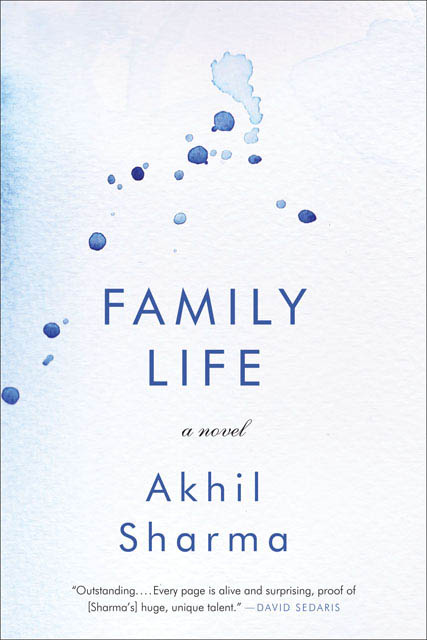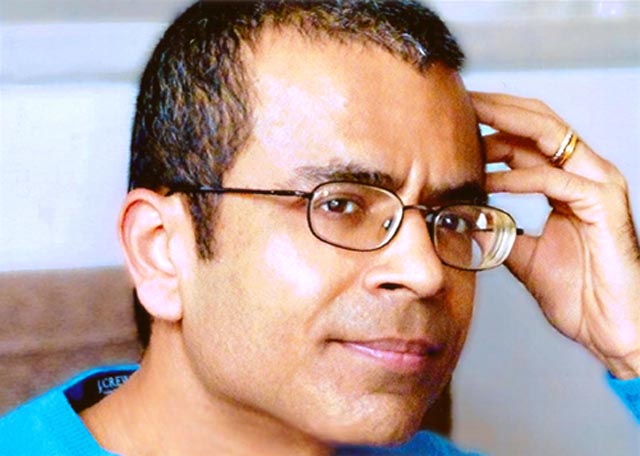Akhil Sharma wins £100,000 International Dublin Literary Award
Breaking News! Indian-American author Akhil Sharma has won the International Dublin Literary Award for his autobiographical novel Family Life. The prize money, €100,000, is the world’s largest for any single published English novel. Sharma beat 150 others from 43 countries to win the award. The panel of judges included authors Ian Sansom, Juan Pablo Villalobos and Carlo Gébler.
More at http://bit.ly/1PiRpjg

Master Storyteller Akhil Sharma’s ‘Family Life’
‘Family Life’, Akhil Sharma’s new novel, is devastating – about the unpredictability of life, of how 3 minutes can change it forever. Yet it is also about the resilience of the human spirit and how we can keep raising the bar on the amount of grief and pain we are able to tolerate – all for love. And sometimes for guilt.
Deceptively small, ‘Family Life’ comes with a lot of turbulence packed into it – each page takes you into human lives which are raw and conflicted.
The story of the Mishras, an immigrant family in Queens is loosely based on Sharma’s own experiences and tells the tale of a family’s nightmare when Birju, the cherished older son who has just been accepted into the prestigious Bronx High School of Science, suffers a pool accident which leaves him severely brain damaged. It is a family in crisis mode and the younger son Ajay has to fill in the gaps and make sense of this new life script.
Sharma’s words involve you right from the first page, whether he’s etching a picture of India, the homeland Ajay left behind, or his experiences in the new world of America. Here’s how he describes the quiet Delhi of the 70’s with its traffic-free streets:
There weren’t VCRs back then, let alone cable channels. A movie would play for 25 or 50 weeks in huge auditorium theaters, and then once the movie was gone, it was gone forever. I remember feeling grief when the enormous billboards for ‘Sholay’ at the end of our street were taken down. It was like somebody had died.
Or this word picture of his father:
I used to think that my father had been assigned to us by the government. This was because he appeared to serve no purpose. When he got home in the evening, all he did was sit in his chair in the living room, drink tea, and read the paper. Often he looked angry. By the time we left for America, I knew that the government had not sent him to live with us. Still, I continued to think he served no purpose. Also, I found him frightening.
It is a book you’re unable to put down nor do you want to miss a single word- almost like the way Indian families visit the suffering Birju to touch his feet to evoke blessings – you want to somehow do the same through reading every word and honor his ordeal.

The Lucky One…
Ajay’s journey is equally intriguing – of how his life is forever bound to that of Birju – joys, successes are all measured in comparison to the bleak non-life his brain-damaged brother leads. Yes, we get to know this immigrant family from India very well and marvel at the tribulations they undergo. All told in the simplest of language so that at times you feel you are sitting next to Ajay and he’s confiding in you, sharing his personal demons. The grief is palpable but so are the joys – but one can empathize with Ajay about the dilemma of wanting the joys and savoring them. For Ajay, there is always the guilt of being the lucky one. Here he interacts with Birju after school:
“Brother-life”, I said, using the phrase because it was melodramatic and because by saying something melodramatic, I could make myself sound ridiculous, like a child, and so not be blamed for my good luck of being OK, “my English teacher wanted us to write a paragraph on what we did during the summer. I didn’t have a pencil. What kind of a fool am I?” As I spoke, I had the feeling that I was being watched. I had the sense that some man was looking at me and that this man knew I was not very good and yet I had received so much of my family’s luck.
And the book, small, unassuming, is packed like a bomb, revealing more and more about human nature as it is opened. I had to read it greedily and then stingily, afraid that it was ending.
It’s about this journey which we all are on – we who don’t set off anywhere without a Google map – we embark on our lives without knowing what’s happening around the bend. We don’t even know the ending of the story we all are a part of. Akhil Sharma takes us on such a journey – and does have an ending for us. Of sorts.
It leaves you thinking, though.
If the Mishras had stayed in India would Birju have been spared? Would the narrative have been different? Or would the same thing have happened in an Indian pool of water? We will never know.
For me, ‘Family Life’ has been more than a book – it kind of consumed me, like a personal matter. And that is Sharma’s power with words. As I read the last lines late one night, my heart was heavy – did the Mishras come all this way to America just to see this unfold?
Life, karma, family griefs and guilts, human hope and persistence – Sharma reveals it all in ‘Family Life’ in an x-ray of the human heart. As I move further away from the book, what stays with me is the dark humor, the never-say-die persistence of Mrs. Mishra, the way in which the family meet and deal with their biggest disappointment.
Life happens – and the Mishras give it their best shot. They are survivors.
(C) Lavina Melwani
Family Life – Hear Akhil Sharma on the back-story of the book
Related Articles:
Jhumpa Lahiri, the Next Rushdie?
Suketu Mehta – Tale of Two Cities
Salman Rushdie, the King of Gup City

2 Comments
Via Google +
God’s Own Kerala and Jean-Jacques Harbonnier
+1’d: A family snapshot from #AkhilSharma –
Via Twitter
MissyLaRue @MissyLarue Jun 22
@lassiwithlavina I loved this book. #AkhilSharma #FamilyLife